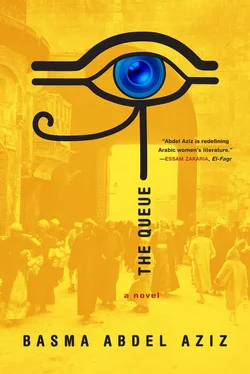Tarek found these last few lines confusing, and he asked a colleague about protocol for eye examinations. He was told that vision tests needed to be approved by the Booth, and that five percent of the results were determined by the official. He usually added the full five percent to the patient’s score, unless he happened to be annoyed that day. Yehya’s meetings with Mrs. Alfat, the head nurse, were observed and recorded in detail, especially their second meeting. It said that Yehya had asked her about her work at the hospital, and whether each nurse had her own specialization. He appeared to be satisfied by her answers, and then he asked her straight out if she would help him remove the bullet, and offered her a considerable sum of money if she would do the surgery herself. He said he would pay her as soon as it was finished, as long as she gave him the bullet. The following sentence said that he showed her a booklet of legal statements exempting her from criminal and medical liability, leaving all responsibility with him if he came to any harm. After Yehya’s offer there was a blank space on the page, and Tarek guessed it was reserved for Mrs. Alfat’s response. Nothing in the paragraph indicated whether she had accepted or rejected his offer.
He thought about it all, suddenly surprised, as if he were discovering it for the first time. He’d opened the file dozens of times, and had never let it out of his sight for long, but he still didn’t have the slightest idea who was recording this information. The strangest part was that until now, Tarek had never truly wondered exactly who was updating the file, or how. He’d spent months among the pages, and every day there was an addition. Whoever it was, they updated it so meticulously, monitoring everything day after day, with dates and sometimes even times. Perhaps deep within himself, he was content watching Yehya from afar, somehow grateful for it all, afraid that if he dug too deep the writing would cease.
In addition to everything else in Document No. 6, Yehya’s medical condition was also documented, and reading it, Tarek realized that Yehya’s health was slowly deteriorating. There was no chance that his condition would stabilize, as he’d hoped it might. Yehya was urinating less frequently, only passing a few drops of liquid each time, which were pinkish and purulent. He often purchased large quantities of heavy-duty painkillers from nearby pharmacies, and his ability to walk and sit had clearly declined. Tarek nearly dropped the file in alarm when he read Yehya’s latest symptoms. He stood up and called Amani, desperately hoping that they weren’t true and that she would say something to assuage his guilt. But Amani didn’t pick up. Maybe she was ignoring him because he’d abandoned them, or it was possible that something had happened to her. He felt as if his own mental state was declining, too; he turned the details over in his mind in their full absurdity, unable to disentangle them from his own emotions. If only he’d just done the surgery before he’d found out that he needed a permit. Even if they had investigated him and summoned him to the Gate, he might have looked like an ignorant fool, swearing he hadn’t known about the law, but he wouldn’t have been forced to lie. Yet now he did know: he couldn’t pretend otherwise, and couldn’t bring himself to lie.
Individuals Accompanying the Patient
Age
ID No:
1. Amani Sayed Ibrahim
37
0307011602131
2. Ismail Mohamed Abdullah
—
—
3. Ragi Sherif Saad
—
—
4. Mariam Fouad Selim
—
—
5. Maged Ahmed Fathy
—
—
The last document in the file contained the names of people who carried Yehya to the nearest hospital when he was shot. Tarek did not recognize any of them except for Amani’s, which was at the top of the list. There were names of four others, three men and a woman, but no information about who they were. There weren’t even ID numbers, and they didn’t appear in the chart of friends and acquaintances, which accounted for most of the file. There was no one he could call to lead him to Yehya, and so he couldn’t offer any help, even though he knew how much Yehya was suffering. Yet he was unable to ignore it all, either, or to pretend as if none of it had happened. The constant turmoil, and his own helplessness in controlling his thoughts and feelings, were choking him. He had been suspended in this gray area, doing nothing for months since he had first opened the file. Now, suddenly, in a moment of wild rage, he decided to go to the queue in search of Yehya.
He arrived at nightfall. The air had a cold bite to it, sending shivers through his whole body, and there wasn’t enough light to make out people’s faces. It was impossible to search through the crowds one by one; a few people offered to guide him, but he had no answer for the question they each asked: “Where in the queue did he say he was?” He’d heard so much about this place, and had listened with intrigue to the stories that new doctors and nurses exchanged, but he’d never imagined that he would find himself lost among its crowds. He’d never imagined that he would fail to find the man whose body bore an injury that set him apart from everyone else, and whose face never left Tarek’s mind, not even while he slept.
He walked as far as he could toward the front, but he never arrived there. Each time he identified a gathering of people in the dim light and imagined he was finally at the head of the queue, he realized that it was just another stop, something like a rest stop. He gradually began to realize how vast the queue was, and what the driver had meant when he told passengers, “This bus goes to the end of the queue, just to the box; if you want the head of the queue, take the other bus.”
Yehya wasn’t there, or if he was, Tarek couldn’t find him. Lights went out and people began to settle down for the night, while others left to return in the morning, but Yehya didn’t appear among those sleeping or leaving. Tarek took out his phone and tried to call Amani again, but she didn’t pick up this time, either, as if she, too, had vanished. He felt an overwhelming sense of loneliness; he was a stranger here. There was a cold sweat on his forehead, his stomach tightened, and he was seized by a single thought: a desire to return to where he had come from, that warm and well-lit room. He found himself in a microbus, automatically getting off in front of the hospital. Once there, he locked the door to his office behind him, swallowed several sedatives, and sat there alone and lost in thought, Yehya’s file open before him.
For weeks before she’d left her job, Amani hadn’t made any sales; she would call her usual customers and then lose her temper in the middle of the conversation by picking needless fights with them. When she hung up on one of their big clients, a hotel owner, her boss called her into his office, took a sizable cut from her salary, and threatened to fire her.
She didn’t object when two weeks later he told her to submit a request for leave without pay, but even after that things didn’t improve. She never left the house, and walked around in a haze all day and night. She was unnerved, anxiously awaiting something indefinable. She was wary when opening the door to anyone, even the mailman, and whenever the Gate’s announcements came onto the television she left the room.
She had nothing to do or think about, just her failure to get the X-ray. She blamed herself constantly, her thoughts spinning endlessly in circles as she thought about what she should have done, and all the mistakes she’d made in Zephyr Hospital. If it weren’t for her, they would have succeeded, and Yehya would have had the surgery without a hitch.
Читать дальше











